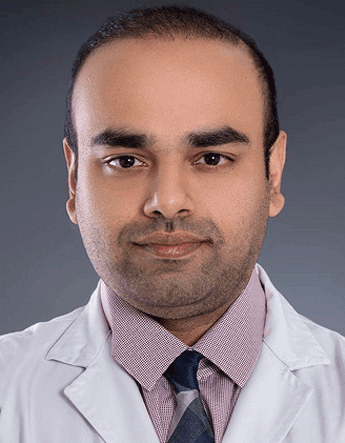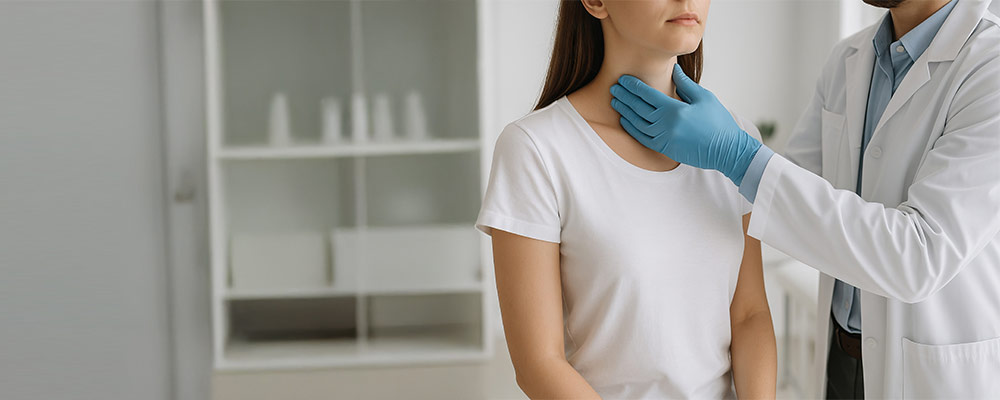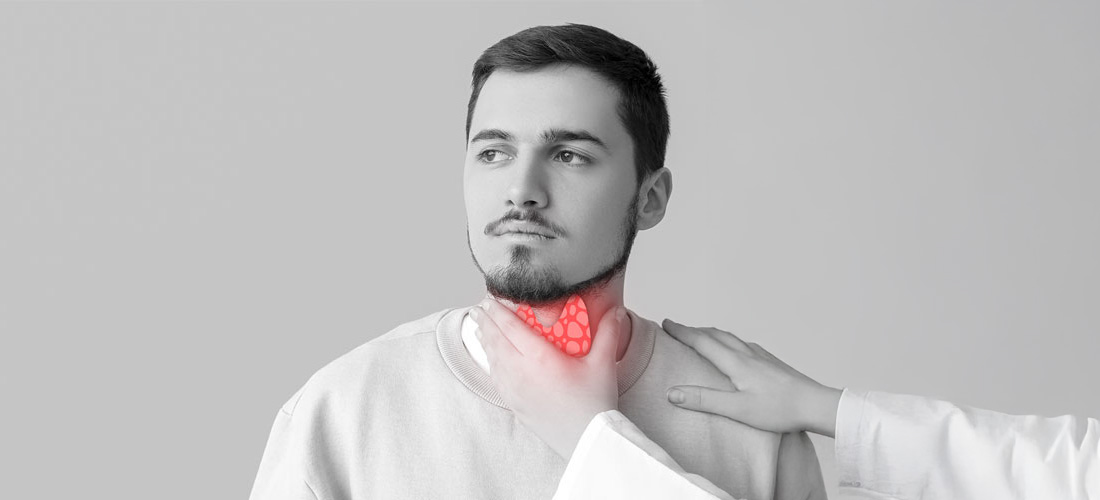Radiofrequency Ablation (RFA) for Thyroid Nodule Care
Thyroid nodules are abnormal lumps or growths that form within the thyroid gland in your neck. While most are benign, some can grow large enough to cause discomfort, compress nearby structures, or raise concern for malignancy.
RFA is an image-guided procedure that uses heat energy to shrink benign thyroid nodules. It’s performed by an interventional radiologist using ultrasound guidance to precisely target and treat the abnormal tissue while leaving the healthy part of your thyroid untouched. At RIVEA, we specialize in advanced, non-surgical thyroid nodule treatment using techniques like Radiofrequency Ablation (RFA), a safe, effective, and scar-free alternative to surgery.
Understanding RFA
When is RFA performed?
RFA is suitable for individuals with:
- Benign thyroid nodules causing neck swelling or cosmetic concerns
- Nodules pressing on the windpipe or food pipe, causing difficulty swallowing or breathing
- Nodules causing discomfort but not cancerous
- Those looking to avoid open surgery or preserve thyroid function
What Happens During the Procedure?
Before the Procedure:
- Patients typically receive a low-dose sedative about 1 hour before or at check-in to help them relax.
- A local anesthetic is applied externally to numb the area around the thyroid gland.
- Patients remain awake but relaxed; some may lightly doze or listen to music during the procedure.
During the Procedure:
- Using continuous ultrasound guidance, the physician inserts a thin needle-like probe into the thyroid nodule.
- Radiofrequency (or microwave) energy is delivered from the tip of the needle.
- The energy heats and precisely erodes targeted nodule tissue while leaving surrounding healthy tissue unaffected.
- The physician carefully moves the probe within the nodule to treat as much of its internal volume as is safe.
After the Procedure:
- The procedure typically lasts 30–60 minutes.
- Patients can expect to go home shortly afterward — no hospital stay required.
- Any mild post-treatment discomfort is usually managed with over-the-counter pain relievers such as acetaminophen.
- Normal activities can often be resumed within 1–2 days.
Recovery instructions after RFA
Recovery instructions after RFA
After your thyroid nodule ablation, please follow these guidelines to support safe recovery:
- Rest quietly at home for the remainder of the day.
- Avoid strenuous activities or heavy exercise for a few days.
- Follow the diet instructions provided by your care team.
- Take all prescribed medications as directed.
- Contact RIVEA if you experience any problems or have concerns.
Seek urgent medical attention if you notice severe symptoms such as:
- Difficulty breathing
- Severe swelling or pain
- High fever
Important Precautions for the First 24 Hours After Procedure:
For your safety:
- Do not drive or ride a bicycle.
- Do not operate machinery or perform tasks requiring concentration or judgment.
- Do not drink alcohol.
- Do not take sleeping tablets or sedatives not prescribed by your doctor.
- Do not go to work or perform work duties.
- Do not make important decisions, sign contracts, or legal documents.
Are There Risks with Thyroid Nodule Ablation?
Radiofrequency Ablation (RFA) is considered safe, minimally invasive, outpatient procedures. Serious complications are rare. However, as with any medical procedure, certain risks exist:
Possible Side Effects:
- Mild localized swelling or redness
- Temporary hoarseness (due to nerve irritation or bruising)
- Minor bleeding at the treatment site
- Skin burns (very rare)
- Infection (very rare, monitored closely by the care team)
How Risks Are Managed:
- Performed under continuous ultrasound guidance for precision
- Strict safety protocols followed throughout the procedure
- Post-procedure monitoring by your physician and clinical team
If you experience any unexpected symptoms after the procedure, contact RIVEA.
Why choose RFA?
Benefits of RFA include:
- No general anesthesia or hospital stay
- No neck scars or stitches
- Preservation of thyroid function
- Minimal pain and downtime
- Return to daily activities within 24 hours
RFA is ideal for patients with benign, symptomatic nodules who wish to avoid surgery or long-term medication.
Why choose RIVEA for thyroid nodule treatment?
At RIVEA Vascular Institute, you’re treated by one of India’s leading experts in minimally invasive interventions. At RIVEA Vascular Institute, we prioritize precision, safety, and patient comfort. Our thyroid embolization program is led by specialists trained in advanced image-guided techniques that eliminate the need for surgery.
At RIVEA you avail:
- Advanced imaging technology for precision targeting
- Personalized consultation and care plans
- Faster access to treatment, no long waits
- Outpatient convenience with high safety standards
FAQs
What Are Thyroid Nodules?
A thyroid nodule is a lump that can develop within the thyroid gland, often discovered during routine exams or imaging. In most cases, nodules are non-cancerous and don’t require immediate intervention. However, if a nodule is large, growing, causing pressure symptoms, or cosmetically concerning, treatment is recommended.
Are thyroid nodules cancerous?
Most thyroid nodules (over 90%) are benign. A fine needle aspiration (FNA) biopsy helps determine whether a nodule is cancerous.
Who is eligible for RFA?
Patients with benign, symptomatic thyroid nodules that are growing, uncomfortable, or cosmetically concerning are ideal candidates.
Does RFA hurt?
RFA is done under local anesthesia with light sedation if needed. Most patients report minimal discomfort during and after the procedure.
Is RFA better than surgery?
For benign nodules, RFA offers effective size reduction without the risks of surgery, visible scars, or thyroid hormone dependence.
How long does RFA take?
The procedure typically takes 30–60 minutes and is performed on an outpatient basis.
Will I need thyroid medication after RFA?
Most patients do not require thyroid hormone therapy after RFA, as the healthy part of the thyroid gland is preserved.
How soon will I see results?
Most nodules shrink by 50–80% within 3–6 months, with continued improvement over time.
Can nodules come back after RFA?
Recurrence is rare, especially when performed by experienced specialists. If needed, a second session can be safely done.
Is RFA safe?
Yes. RFA is a well-established technique with a strong safety profile and minimal risk of complications when performed by trained experts.
Our Team
-

Dr. Arjun Reddy
MBBS, MD
Chief Interventional RadiologistDr. Arjun Reddy is a highly accomplished Interventional Radiologist with extensive international training and a track record of pioneering minimally invasive, image-guided procedures in India.
View Profile Book an Appointment


